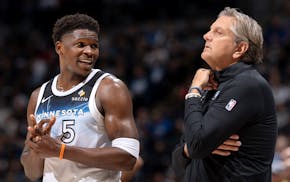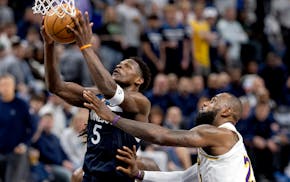They lined the streets and skyways of Minneapolis. They crowded into a corner of Target Center, waiting for their hero to leave the court, then cried when she signed shirts and programs.
Caitlin Clark performed her latest star turn Saturday, the night that the Lynx retired the jersey of Maya Moore Irons.
Clark was once one of those children begging for attention from a hero. Clark grew up in Iowa, idolizing the great Minnesota Lynx teams, particularly the great player then known as Maya Moore.
On Saturday, before the Lynx defeated Clark's Indiana Fever 90-80, Clark remembered another night in Target Center.
"I think it was my first WNBA game," Clark said. "I didn't have a Sharpie, and I was at the age where I didn't have a phone. I kind of ran away from my dad because I wanted to meet the players, and I just ran up to her and gave her a hug. There's no documentation of that moment, but, in my brain, that was one of the most pivotal moments of my life and probably my entire basketball career."
The Lynx probably could have maximized ticket sales by playing host to Clark and their latest jersey retirement from their four championship teams on different nights. Instead, they chose poetry.
Moore Irons' brilliance led to Clark's ambition, and both changed the perception of women's basketball.
There are still those who sneer at women's sports. There are also those who offer backhand compliments, pretending to appreciate women's "fundamentals."
Moore Irons and Clark destroy those stereotypes.
Moore Irons was an explosive and flamboyant athlete. One of the secrets of the Lynx championship years was that on a team filled with players who could perfectly execute any play, she was the one who would go the wrong direction and make it right, with a long three-pointer or an under-the-rim, blind, reverse layup.
Clark can hit sidestepping, off-balance 26 footers with a hand in her face, then, on the next possession, throw a no-look pass to a barely open teammate.
No right-minded fan could watch Moore Irons or Clark without gasping, and fully crediting them as entertainers.
"With Caitlin, and the full-circle moment, it just feels like you couldn't have planned it any better," Moore Irons said.
Saturday night's announced crowd surpassed Clark's last visit as the largest-ever regular season crowd in franchise history, 19,023. Only the Game 5 of the 2016 WNBA Finals was larger, at 19,423. Tickets for Saturday's game were going for $4,000 on the secondary market. Perhaps it's only coincidence, but both attendance records ended with Moore Irons' number 23.
Clark is used to crowds. Had progress arrived earlier, Moore Irons would never have seen an empty seat.
Lynx coach Cheryl Reeve, addressing a packed pregame news conference, said: "The importance for the W is that you're all standing here. I don't think it's just for Maya Moore."
Reeve said Clark's national popularity reminded her of the impact of NBA stars. "It was really cool, her senior year in college, to see that take hold," Reeve said. "It wasn't just the Iowa fans. She became a road show. I don't want to slight anyone in college, but I don't remember seeing that in my time."
Long before Moore Irons left basketball to save a man's life, she did her good works in Minnesota, while accepting hugs from children in the back rooms of Target Center.
That's where the Lynx celebrated Moore Irons on Saturday night, with teammates gathering to give gifts and tell stories. "That was very overwhelming," Moore Irons said.
Reeve looked at Moore Irons sitting next to her husband, Jonathan Irons, whom she helped free from unjust imprisonment, and called that the greatest win of her career.
Remember that mural of Moore Irons with her arms outstretched on a Minneapolis building? She wrapped them around a generation of young basketball players, including a dark-haired child who snuck in a hug long ago.
"My life," Moore Irons said, "is an example of what happens when we love a little girl well."
For Clark and the latest Lynx honoree, hoops and full circles are the same thing.

Souhan: 'In Finchy we trust' a true calling card for the Wolves

Souhan: Wild simply didn't play well enough to beat Vegas in playoff series

Souhan: Make no mistake, the Vikings are O'Connell's team

Souhan: Timberwolves star works in a shove while pushing Lakers to a precipice

